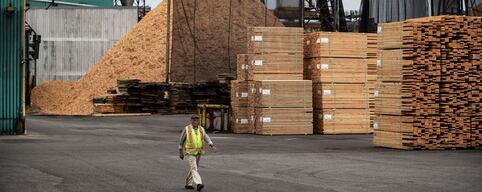

The recent announcement of the United States' decision to significantly increase the duty on softwood lumber imports from Canada has sparked major concerns and reactions on both sides of the border. The duty is set to rise from 14.54% to a staggering 34.45%, which has naturally generated a flurry of discussion regarding the implications for trade relations, economic impacts on the Canadian forestry industry, and the political tensions it may exacerbate.
The duty increase is a continuation of the long-standing trade tensions between the U.S. and Canada, especially in the forestry sector. This decision, yet to be officially posted in the U.S. Federal Register, has nonetheless been confirmed by sources on both sides. The B.C. premier's office and the U.S. Lumber Coalition have acknowledged the measure as an impending reality, which promises to affect economic relations significantly. For years, Canada and the United States have had a complex trade relationship, with softwood lumber duties being a recurring issue that resurfaces periodically in negotiations and trade agreements.
Historically, the U.S. has imposed duties on Canadian softwood lumber with the argument that Canadian lumber is subsidized unfairly, giving Canadian producers an edge over their American counterparts. Canada, however, has consistently disputed these claims and taken the matter to international trade bodies. The increase in duties underscores an ongoing dispute that not only affects the lumber industries on both sides but also sets a tone of protectionism that could spill over into other sectors. As such, businesses reliant on smooth cross-border trade might find themselves navigating increased tensions, regulatory hurdles, and potentially higher costs.
The decision comes as a profound challenge for British Columbia’s forestry industry, which has already been grappling with economic setbacks including layoffs. The increase in duties could result in reduced export opportunities to one of B.C.'s largest markets, which could, in turn, produce a chilling effect on the industry's workforce and broader economy. Premier David Eby has spoken strongly against the U.S. decision, highlighting the adverse effects it could have on forest workers and communities reliant on the forestry sector.
B.C. Premier David Eby condemned the move, describing it as an "attack on forest workers and British Columbians."
The prospect of a further inhibited market means not only job losses but potential ripple effects across industries connected to forestry. Logs and lumber are vital commodities in numerous construction and manufacturing processes, and the increased costs due to higher duties might lead to a downstream increase in the price of goods, from housing and furniture to paper products. The financial strain on businesses and loss of economic activity could ultimately mean that communities dependent on the forestry industry could face an uphill battle in maintaining economic viability.
Efforts to adapt could include seeking alternative markets or increasing domestic consumption, yet these measures may not immediately counterbalance the loss of revenue from U.S. trade.
Besides the immediate economic concerns, Premier Eby's remarks emphasize a call for national unity amongst Canadians in response to what many view as 'unjustified' duties. The sentiment of solidarity resonates especially in light of potential broader implications on U.S.-Canada relations. There is an acknowledged interdependence between the two nations not just economically but socially, given the deep personal and business connections that transcend borders. The imposition of such steep duties risks alienating these ties, introducing unexpected challenges to otherwise friendly cross-border relations.
With Canada poised to respond diplomatically and, possibly, through legal channels, the coming months will likely see negotiations and strategic communications play out on the international stage. As this situation unfolds, industry stakeholders, policymakers, and communities on both sides will be closely watching, gauging responses and ramifications in a rapidly evolving trade landscape.



